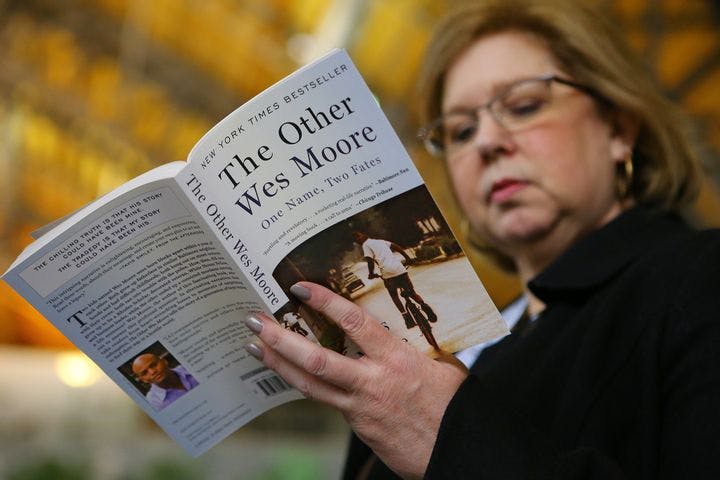Summer 2010
Life Chances
– Rich Benjamin
The three pillars that once bolstered black Americans—community, school, and family—are now miserably failing at-risk black kids.
Fatherhood is a touchy subject among black American men. Well over half of black kids grow up in a household without a dad. No wonder black public figures ranging from Louis Farrakhan to Bill Cosby to President Barack Obama have exhorted black men to “step up” and be responsible fathers. Some liberal advocates dismiss these pleas as bootstrap sermons that blame poor blacks for systemic problems. Others, conservative and liberal alike, counter that the three pillars that once bolstered black Americans—community, school, and family—are now miserably failing at-risk black kids, not least because of the plague of deadbeat dads.
The Other Wes Moore chronicles the parallel lives of two black men from Baltimore’s hardscrabble turf. The author overcomes his financially challenged, fatherless childhood to become a husband, Rhodes Scholar, White House fellow, and investment banker. The “other” Wes Moore, who is two years older, emerges from a financially challenged, fatherless childhood to receive a life-without-parole sentence for his role in a cop slaying during a botched robbery in 2000. It’s as if Pudd’nhead Wilson met The Prince and the Pauper on the streets of black America. How did these two men wind up in such radically different places?
Moore interweaves their stories in an elegant narrative, bobbing between living rooms, basketball courts, alleys, lawns, stoops, and, most important, the prison visiting room where he interviews the other Wes Moore, whose existence the author discovered in a newspaper story about the robbery. It was not random events that launched these boys on dramatically different paths. Rather, it was the influence of adults. At the most vulnerable moments in his life, members of the author’s family doubled down to make sure he was properly supervised, and made prescient, commonsense decisions, such as sending him to military school after a minor brush with the law. Meanwhile, the other Wes Moore’s family made spectacularly poor decisions in the face of already meager options. His older brother dealt drugs, survived three gunshot wounds, then earnestly begged Wes not to do as he had done. Wes’s mother kept weed in the house, then acted shocked to discover her son’s drug stash.
The incarcerated Wes Moore’s story doesn’t deliver anywhere near the high-stakes drama seen in gritty entertainments such as the HBO crime series The Wire or last year’s film Precious. The realities of his four out-of-wedlock children, drug dealing, and gang-banging exploits make for a tale that is flat and rather familiar, his biography one more episode in the media’s narrative of black pathology. As Obama noted in The Audacity of Hope, “The images of the so-called underclass are ubiquitous, a permanent fixture in American popular culture.”
Well over half of black kids grow up without a dad, which has led many black public figure to exhort black men to "step up" and be responsible fathers.
The author’s story, on the other hand, reads like an original road map of the contemporary striver’s path to the mandarin class. Moore is a modern-day Horatio Alger whooshing through the revolving doors of military enlistment, public service, and global finance. The coming-of-age memoir that inspired him was not The Autobiography of Malcolm X but Colin Powell’s My American Journey. That’s no accident. Like Powell and Obama, the author is the child of an immigrant. The contrast between his story and the other Wes Moore’s is explained in part by the different experiences of black immigrants from Africa and the Caribbean and native-born black Americans, who on average have lower educational attainment, lower incomes, and higher incarceration rates.
Wes Moore is an artful storyteller, but he’s not a particularly fine writer. His sentences are pocked with clichés along the lines of “that fateful day.” Particularly grating is his habit of giving women eyes that “twinkled,” are “scintillating,” or are “almond-shaped.” This is not just sloppy writing; Moore’s idolatry of women lets them off the hook in this tale of social woe. While he often castigates men for their personal deficiencies, he glosses over the serial pregnancies of many black women who are not equipped to raise the kids they conceive.
However, insights and graceful sentences punctuate the often mediocre writing. After his father’s death, Moore’s mother moved the family to the Bronx, where, he writes, “the idea of life’s impermanence underlined everything for kids my age—it drove some of us to a paralyzing apathy, stopped us from even thinking too far into the future. Others were driven to what, in retrospect, was a sort of permanent state of mourning: for our loved ones, who always seemed at risk, and for our own lives, which felt so fragile and vulnerable.” The book’s chief triumph is to capture so matter-of-factly the permanent state of mourning experienced by an entire generation of black men who grew up without fathers.
* * *
Rich Benjamin is the author of Searching for Whitopia: An Improbable Journey to the Heart of White America, which earned a 2009 Editor’s Choice award from Booklist/The American Library Association. He is a senior fellow at Demos, a nonpartisan think tank.
Reviewed: The Other Wes Moore: One Name and Two Fates by Wes Moore, Spiegel & Grau, 233 pp, 2010.
Photo courtesy of The American Library Association
